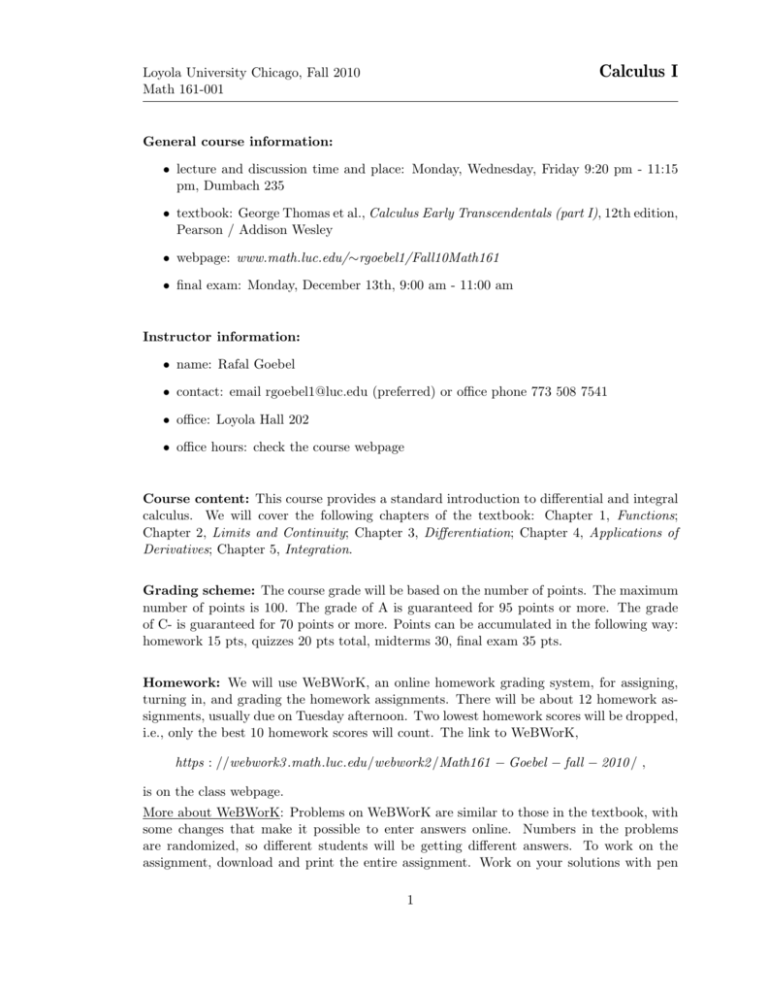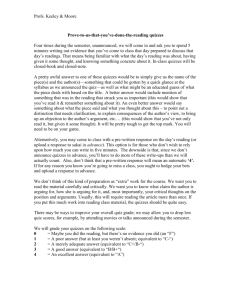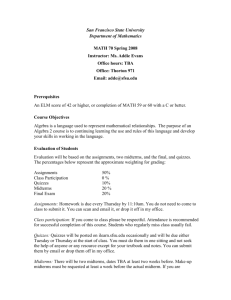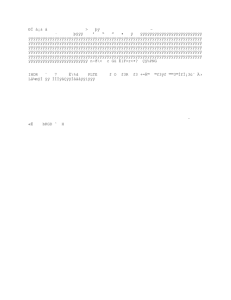
Calculus I
Loyola University Chicago, Fall 2010
Math 161-001
General course information:
• lecture and discussion time and place: Monday, Wednesday, Friday 9:20 pm - 11:15
pm, Dumbach 235
• textbook: George Thomas et al., Calculus Early Transcendentals (part I), 12th edition,
Pearson / Addison Wesley
• webpage: www.math.luc.edu/∼rgoebel1/Fall10Math161
• final exam: Monday, December 13th, 9:00 am - 11:00 am
Instructor information:
• name: Rafal Goebel
• contact: email rgoebel1@luc.edu (preferred) or office phone 773 508 7541
• office: Loyola Hall 202
• office hours: check the course webpage
Course content: This course provides a standard introduction to differential and integral
calculus. We will cover the following chapters of the textbook: Chapter 1, Functions;
Chapter 2, Limits and Continuity; Chapter 3, Differentiation; Chapter 4, Applications of
Derivatives; Chapter 5, Integration.
Grading scheme: The course grade will be based on the number of points. The maximum
number of points is 100. The grade of A is guaranteed for 95 points or more. The grade
of C- is guaranteed for 70 points or more. Points can be accumulated in the following way:
homework 15 pts, quizzes 20 pts total, midterms 30, final exam 35 pts.
Homework: We will use WeBWorK, an online homework grading system, for assigning,
turning in, and grading the homework assignments. There will be about 12 homework assignments, usually due on Tuesday afternoon. Two lowest homework scores will be dropped,
i.e., only the best 10 homework scores will count. The link to WeBWorK,
https : //webwork3 .math.luc.edu/webwork2 /Math161 − Goebel − fall − 2010 / ,
is on the class webpage.
More about WeBWorK: Problems on WeBWorK are similar to those in the textbook, with
some changes that make it possible to enter answers online. Numbers in the problems
are randomized, so different students will be getting different answers. To work on the
assignment, download and print the entire assignment. Work on your solutions with pen
1
and paper. When you are done, enter the answers online, before the due date. WeBWorK
will check your answer and tell you if you are correct. If you get a wrong answer, you may
try again, before the due date, as many as 5 times with no penalty. The due time will
usually be 3 pm, solutions will be made available online several hours later.
Collaboration on homework is allowed, and in fact encouraged. Talk about homework to
your classmates, work on the problems together, form study groups. However, your final
solution and answer should be your own.
Quizzes: There will be 5 quizzes, at the end of the lectures on the following Wednesdays:
September 8th, 22nd; October 20th; November 3rd; December 1st. Each quiz will be about
30 minutes long. Each quiz will cover the material from the homework due the day before
the quiz and the previous homework. Problems on the quiz will be similar to the homework
problems. Your worst quiz score will be dropped. Quizzes are closed-book. No notes.
Collaboration is not allowed.
Midterms: There will be 2 midterms, on the following Wednesdays: October 6th, November 10th. Each midterm will be about 75 minutes long. Problems on the midterms will
be similar to the sample midterm problems, which will be provided in the days before the
midterms. Midterms are closed-book, but one letter-sized, one-sided sheet of handwritten
notes is allowed. Collaboration is not allowed.
Final: There will be one final exam, on Monday, December 13th, 9:00 am - 11:00 am. It
will cover all of the course material. Problems on the final will be similar to the sample
final problems solved in the review lectures before the final exam. Final is closed-book, but
one letter-sized, double-sided sheet of handwritten notes is allowed. Collaboration is not
allowed.
Missing quizzes or exams: Usually, only religious holidays, official Loyola athletic activities, and well-documented emergencies are basis for a make-up quiz or late turn-in of
homework. In general, the sooner you notify the instructor about a conflict with a quiz or an
exam, the better. Missing a quiz without prior notification and without a well-documented
emergency or other extenuating circumstances will result in a score of 0.
Academic integrity: All work performed during quizzes and final exam must be your
own work. Cheating may result in a grade of ”F” and notification of the appropriate
dean. Cheating during quizzes, midterms, and the final includes, but is not limited to:
copying another person’s work, allowing another person to copy your work, collaborating
with another person, using unauthorized references, etc. Remember though: collaboration
on homework assignments is OK, and in fact is encouraged.
2








